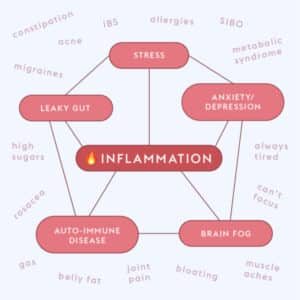
To stay our healthiest, we must reduce our chronic inflammation and build strong immune systems! But how do we do that?
First, what is inflammation?
Inflammation is a natural process that helps our body defend and heal itself from infection, illness, or injury. Inflammation is caused because lots of white blood cells rush to a problem area to help protect us against unwelcome intruders. This causes your blood flow to increase, which in turn causes the area to become red and warm. The white blood cells will also release chemicals that irritate the tissues and potentially cause pain. Inflammation is caused by several things to include injuries, Chemical Irritants, and the biggie- Diet!
Inflammation can be either Acute or Short-term which includes redness, pain, heat, and swelling. For instance, when you have an infected cut, the affected area is usually red, warm to the touch, and often swollen.
Inflammation can also be Chronic or Long-term and often occurs inside your body without any noticeable symptoms. This type of inflammation can drive illnesses like diabetes, heart disease, and high blood pressure, fatty liver disease, obesity, and potentially even cancer, and often dietary and/or stress-related.
When inflammation becomes chronic, it leads to many serious health problems. For instance, as part of an inflammatory response, your body increases its production of white blood cells, immune cells, and substances called cytokines that help fight infection. Normally, a healthy immune response will clear the infection. However, an immune system already stressed from fighting chronic inflammation in the body can create an inadequate response by over activating the immune cells, leading to a potential cytokine storm. These Cytokine storms (cytokine release syndrome) are life-threatening systemic inflammatory situations that happen when an infection triggers your immune system to flood your bloodstream with inflammatory proteins called cytokines which can damage tissues or destroy vital organs. (Sound familiar- cytokine storms are currently associated with severe cases of COVID-19).
How do I know if I have inflammation? If you have any of these, you have inflammation:
- backaches
- headaches
- arthritis of any kind
- IBS
- autoimmune disorders
- obesity
- heart disease
- type 1 or 2 Diabetes
- high cholesterol or a high triglyceride level
- food sensitivities
- skin issues or tummy issues
So when does your “Diet” play in creating and reducing chronic inflammation?
Chronic inflammation is often caused by consuming high amounts of sugar or lots of refined carbs like pastries, cakes, and bread. Packaged foods with the transfats and preservatives within them, processed meats, excessive alcohol, and vegetable oils all play a part too! Reducing inflammation starts by adopting a healthy anti-inflammatory diet of eating whole, nutrient-dense foods that contain antioxidants, avoiding processed and sugary foods, and getting adequate exercise and good sleep. Antioxidants work by reducing levels of the reactive molecules- free radicals, which are created as a natural part of your metabolism but can lead to inflammation when they are not held in check.
So where do I start?
Anti-inflammatory diets start by eating LESS of, or cutting the following foods out completely:
- Sugary beverages: Sugar-sweetened drinks and fruit juices
- Refined carbs: White bread, white pasta, etc.
- Desserts: Cookies, candy, cake, and ice cream
- Processed meat: Hot dogs, bologna, sausages, etc.
- Processed snack foods: Crackers, chips, and pretzels
- Certain oils: Processed seed and vegetable oils like soybean and corn oil
- Trans fats: Foods with partially hydrogenated ingredients
- Alcohol: Excessive alcohol consumption
And eating MORE of these anti-inflammatory foods:
- Non-starchy vegetables: Broccoli, kale, Brussels sprouts, cabbage, cauliflower, etc.
- Fruit: Especially deeply colored berries like grapes and cherries
- High-fat fruits: Avocados and olives
- Healthy fats: Olive oil and coconut oil
- Fatty fish: Salmon, sardines, herring, mackerel, and anchovies
- Nuts: Almonds and other nuts
- Peppers: Bell peppers and chili peppers
- Chocolate: Dark chocolate
- Spices: Turmeric, fenugreek, cinnamon, etc.
- Tea: Green tea
- Red wine: Up to 5 ounces (140 ml) of red wine per day for women and 10 ounces (280 ml) per day for men
Looking for more information, then join us in The Wellness Cafe where we are talking about everything inflammation!

Recent Comments